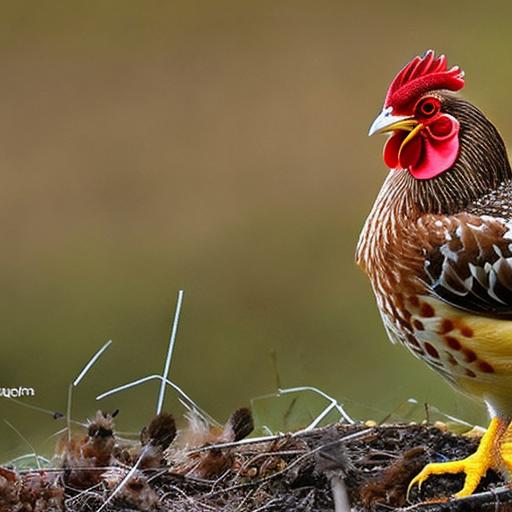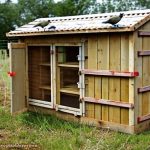Keeping chickens can be a fun and rewarding experience, but it’s important to keep them safe from predators. Whether you have a small backyard flock or a larger farm operation, predators can pose a serious threat to your chickens. In this blog post, we’ll discuss various ways to protect your chickens from predators and maintain a safe environment for them.
Key Takeaways
- Understanding the predators in your area is crucial to keeping your chickens safe.
- Securing your chicken coop with strong locks and materials can prevent predators from getting in.
- Choosing the right type of chicken coop, such as a raised coop, can make it harder for predators to access.
- Installing fencing around your coop and using motion-activated lights and alarms can deter predators.
- Training your chickens to stay close to the coop and to recognize danger can help keep them safe.
Understanding the Predators in Your Area
The first step in protecting your chickens is to understand the predators in your area. Common predators include raccoons, foxes, coyotes, dogs, cats, hawks, and owls. Each predator has its own habits and methods of attack, so it’s important to research the predators in your area to better protect your chickens.
For example, raccoons are known for their ability to open doors and windows, so it’s important to use sturdy materials and secure locks on your chicken coop. Foxes are skilled diggers, so burying fencing at least 1 foot deep can help prevent them from digging under the fence. Hawks and owls are aerial predators, so covering the chicken run with netting or wire can help protect your chickens from attacks.
Securing Your Chicken Coop: Tips and Tricks
A secure chicken coop is essential in protecting your chickens from predators. There are several tips and tricks you can use to ensure that your coop is predator-proof.
Firstly, use sturdy materials when building or purchasing a chicken coop. Predators like raccoons and foxes can easily break through flimsy materials, so opt for strong and durable materials like wood or metal.
Secondly, make sure all doors and windows are securely locked at night. Predators are most active during the night, so it’s important to have a secure coop that they cannot easily access.
Lastly, cover any gaps or holes in the coop with hardware cloth or mesh. Predators like rats and snakes can squeeze through small openings, so it’s important to seal off any potential entry points.
Additionally, you can add a predator-proof skirt around the perimeter of the coop. This involves burying wire mesh or hardware cloth around the coop to prevent predators from digging under the fence.
Choosing the Right Type of Chicken Coop to Keep Predators Out
When choosing a chicken coop, it’s important to consider the type of predators in your area. Different predators require different types of coop designs to keep them out.
For example, if you have burrowing predators like rats or snakes in your area, it’s important to choose a coop with a solid floor and sturdy walls. This will prevent them from burrowing into the coop and attacking your chickens.
If you have aerial predators like hawks or owls in your area, choose a coop with a secure roof and covered windows. This will prevent them from swooping down and attacking your chickens from above.
Installing Fencing to Keep Predators Away from Your Chickens
Fencing can be an effective way to keep predators away from your chickens. A fence should be at least 6 feet tall to prevent predators from jumping over it. Additionally, burying the fence at least 1 foot deep can prevent digging predators from getting under it.
There are several types of fencing that can be used to protect your chickens. Chain-link fencing is a popular choice as it is sturdy and durable. Electric fencing can also be used as a deterrent for predators. The electric shock will discourage predators from attempting to breach the fence.
It’s important to regularly inspect and maintain your fencing to ensure that there are no gaps or weak spots that predators can exploit.
Using Motion-Activated Lights and Alarms to Deter Predators

Motion-activated lights and alarms can be used to scare off predators. Lights can be set up around the coop to deter nocturnal predators like raccoons and foxes. When the motion sensor detects movement, the lights will turn on, startling the predator and hopefully scaring them away.
Alarms can also be set up to sound when a predator is detected. This can be an effective deterrent as the loud noise will startle the predator and alert you to their presence.
It’s important to note that while lights and alarms can be effective deterrents, they should not be relied upon as the sole method of predator prevention. They should be used in conjunction with other strategies, such as secure fencing and a well-built coop.
Protecting Your Chickens from Aerial Predators
Aerial predators like hawks and owls can be a threat to your chickens, especially if they are free-ranging. These predators have sharp talons and beaks that can easily injure or kill a chicken.
To protect your chickens from aerial attacks, cover the chicken run with netting or wire. This will prevent hawks and owls from swooping down and grabbing your chickens.
Additionally, providing hiding spots like bushes or trees can give your chickens a place to escape if they sense danger from above. A well-vegetated area can also provide cover for your chickens, making it more difficult for aerial predators to spot them.
Keeping Your Chickens Safe from Rodents and Snakes
Rodents and snakes can be a threat to your chickens, even if they don’t directly attack them. Rodents can carry diseases that can be harmful to your chickens, while snakes can pose a physical threat.
To keep rodents away from your coop, keep the area clean and free of debris. Remove any spilled feed or water that may attract rodents. Regularly clean out the coop and remove any bedding or droppings that may attract rodents.
Using hardware cloth or mesh to cover any gaps or holes in the coop can help keep out snakes. Snakes can squeeze through small openings, so it’s important to seal off any potential entry points.
Training Your Chickens to Stay Safe from Predators
Training your chickens to stay safe from predators can help prevent attacks. Chickens have natural instincts to hide and flee from danger, but providing them with additional hiding spots and perches can give them a place to escape if they sense danger.
You can also make loud noises or use a spray bottle to deter predators. This will startle the predator and hopefully discourage them from approaching your chickens.
It’s important to note that training your chickens may take time and patience. It’s also important to ensure that your training methods do not cause unnecessary stress or harm to your chickens.
Maintaining a Safe and Secure Environment for Your Chickens
Keeping your chickens safe from predators requires a combination of strategies. By understanding the predators in your area, securing your coop, using fencing and deterrents, and training your chickens, you can maintain a safe and secure environment for your feathered friends.
Remember to regularly inspect and maintain your coop and fencing to ensure that there are no weak spots or gaps that predators can exploit. Stay vigilant and be proactive in protecting your chickens from predators. With the right precautions in place, you can enjoy the benefits of keeping chickens while keeping them safe from harm.
If you’re a chicken owner, you know how important it is to keep your feathered friends safe from predators. One of the key aspects of protecting your chickens is ensuring their coop is secure. In a helpful article on Poultry Wizard, you can learn about the top 10 features to consider when building a chicken coop. From sturdy fencing to predator-proof locks, this article provides valuable insights on how to create a safe and secure environment for your chickens. Check out the article here to learn more about keeping your chickens safe from predators.
FAQs
What are some common predators that pose a threat to chickens?
Common predators that pose a threat to chickens include foxes, raccoons, coyotes, hawks, owls, snakes, and domestic dogs.
How can I protect my chickens from predators?
You can protect your chickens from predators by building a secure coop and run, using hardware cloth instead of chicken wire, installing motion-activated lights and alarms, and keeping your chickens locked up at night.
What should I do if a predator attacks my chickens?
If a predator attacks your chickens, you should immediately remove any injured or dead birds from the coop and run, repair any damage to the coop or run, and reinforce any weak spots to prevent future attacks.
Can I use a guard animal to protect my chickens?
Yes, you can use a guard animal such as a dog or a donkey to protect your chickens from predators. However, it is important to properly train and supervise the guard animal to ensure the safety of both the chickens and the animal.
What are some signs that my chickens are being targeted by predators?
Signs that your chickens are being targeted by predators include missing birds, feathers scattered around the coop or run, and signs of forced entry into the coop or run. Additionally, you may hear or see predators lurking around the coop or run.
Meet Walter, the feathered-friend fanatic of Florida! Nestled in the sunshine state, Walter struts through life with his feathered companions, clucking his way to happiness. With a coop that’s fancier than a five-star hotel, he’s the Don Juan of the chicken world. When he’s not teaching his hens to do the cha-cha, you’ll find him in a heated debate with his prized rooster, Sir Clucks-a-Lot. Walter’s poultry passion is no yolk; he’s the sunny-side-up guy you never knew you needed in your flock of friends!







